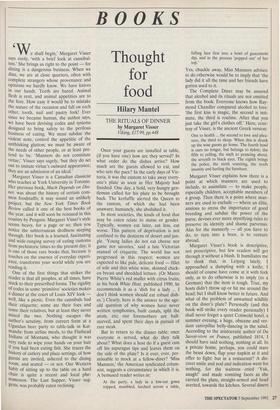BOOKS
Thought for food
Hilary Mantel
THE RITUALS OF DINNER by Margaret Visser Viking, £17.99, pp.448 We shall begin,' Margaret Visser says cooly, 'with a brief look at cannibal- ism.' She brings us right to the point — for dining is a dangerous business. When we dine, we are at close quarters, often with complete strangers whose provenance and opinions we hardly know. We have knives in our hands. Teeth are bared. Animal flesh is rent, and animal appetities are to the fore. How easy it would be to mistake the nature of the occasion and fall on each other, tooth, nail and pastry fork! Ever since we became human, the author says, we have been devising codes and systems designed to bring safety to the perilous business of eating. We must subdue the violent note, control the appetitie of the unthinking glutton; we must be aware of the needs of other people, or at least pre- tend to be. 'Manners do not constitute virtue,' Visser says sagely, 'but they do set out to imitate virtue's outward appearance; they are an admission of an ideal.'
Margaret Visser is a Canadian classicist who teaches at York University in Toronto. Her previous book, Much Depends on Din- ner, was about the history of certain com- mon foodstuffs; it may sound an unlikely project, but the New York Times Book Review called it one of the best books of the year, and it will soon be reissued in this Country by Penguin. Margaret Visser's style seems heavy, for a page or so; then you notice the subterranean drollness seeping through. Her book is a learned, fascinating and wide-ranging survey of eating customs from prehistoric times to the present day; it is one of those rare books that, because it touches on the essence of everyday experi- ence, transforms your world while you are reading it.
One of the first things that strikes the reader is that all peoples, at all times, have stuck to their prescribed forms. The rigidity of codes in some 'primitive' societies makes a dinner at the court of Louis XIV look well, like a picnic. Even the cannibals had their etiquette; some ate their foes and some their relatives, but at least they never mixed the two. Nothing escapes the author's scrutiny, from correct form at a Ugandan beer party to table-talk in Kat- mandu: from airline meals, to the Flathead Indians of Montana, who thought it was very rude to wipe your hands on your hair if you had been eating fish. She traces the history of cutlery and place settings, of how guests are invited, ushered to the dining room, and seated — or not. Our Western habit of sitting up to the table on a hard chair is quite a recent and local phe- nomenon. The Last Supper, Visser sug- gests, was probably eaten reclining.
Once your guests are installed at table, (if you have one) how are they served? In what order do the dishes arrive? How much are the guests allowed to eat, and who sets the pace? In the early days of Vic- toria, it was the custom to take away every- one's plate as soon as Her Majesty had finished. One day, a bold, very hungry gen- tleman called for his plate to be brought back. The kerfuffle alerted the Queen to the custom, of which she had been unaware; humanely, she abolished it.
In most societies, the kinds of food that may be eaten relate to status or gender. Typically, women eat later, eat less, eat worse. This pattern of deprivation is not confined to the denizens of desert and jun- gle. 'Young ladies do not eat cheese nor game nor savories,' said a late Victorian manual of etiquette. The world has not progressed in this respect; women are expected to like pale, delicate food — fillet of sole and thin white wine, skinned chick- en breast and shredded lettuce. (Or Marco Pierre White's red mullet with citrus fruits; in his book White Heat, published 1990, he recommends it as a 'dish for a lady ... I don't think women should eat robust dish- es.') Clearly, here is the answer to the age- old question of why women have never written symphonies, built canals, split the atom, etc; our foremothers are half- starved, and spent their days in pursuit of rare steak.
But to return to the dinner table: once everyone is served, what do they talk about? What does a host do if a guest cuts off his asparagus tips and leaves them on the side of the plate? Is it ever, ever, per- missable to mock at a fellow-diner? 'Miss Manners,' the American syndicated colum- nist, suggests a circumstance in which it is. A bemused reader writes in:
At the party, a lady in a low-cut gown tripped, stumbled, lurched across a table, falling face first into a bowl of guacomole dip, and in the process 'popped out' of her top.'
Yes, chuckle away, Miss Manners advises: to do otherwise would be to imply that 'the lady did it all the time and her friends have gotten used to it.
The Complete Diner may be assured that alcohol and its rituals are not omitted
One to health ... the second to love and plea- sure, the third to sleep. When this is drunk up the wise guests go home. The fourth bowl is ours no longer, but belongs to hybris; the fifth to yelling, the sixth to prancing about, the seventh to black eyes. The eighth brings the police, the ninth vomiting, the tenth insanity and hurling the furniture.
Margaret Visser explains how there is a point at which manners are used to include, to assimilate — to make people, especially children, acceptable members of a group. Then there is a point where man- ners are used to exclude — where an elite, anxious to stress the importance of good breeding and subdue the power of the purse, devises ever more mystifying rules to preserve its identity and shame parvenus. Alas for the mannerly — all you have to do, to turn into a boor, is to venture abroad.
Margaret Visser's book is descriptive, not prescriptive, but few readers will get through it without a blush. It humiliates me to think that, in Leipzig lately, I approached a dumpling with a knife; I should of course have come at it with fork only, as to do otherwise is to imply (to a German) that the item is tough. True, my hosts didn't throw up or hit me around the head; but I shall know better in future. And what of the problem of unwanted wildlife on the diner's plate? Personally (and this book will strike every reader personally) I shall never forget a quiet Cotswold hotel, a summer evening, a huge, obscene and ver- dant caterpillar belly-dancing in the salad. According to the aristocratic author of Du Savoir-vivre en France, published 1814, I should have said nothing, nothing at all. In a private home, perhaps, you could stare the beast down, flap your napkin at it and offer to fight: but in a restaurant? A dis- creet smile and nod and indication went for nothing, for the waitress cried `Yuk, aaugh!' and made vomiting faces as she carried the plate, straight-armed and head averted, towards the kitchen. Several diners
panicked, paled; but what is the proper thing to do? At least I now know what Emily Post recommends, for a lady seated next to a man she despises. She may say:
'I shall not talk to you — because I don't care to. But for the sake of my hostess I shall say my multiplication tables.'
She then begins 'Twice one are two ...' The gentleman, if he is not an utter cad, inclines his head and murmurs 'Twice two are four.' And so on, till the ordeal is over. By extension, this is a good way to go on if a thoughtless seating plan puts you next to a sacked lover; it could also be a polite ploy among old associates who have long ago agreed they have no small talk.
Are we ruder than we used to be? Mar- garet Visser devotes her final chapter to the question, but comes to no definite con- clusion. I would suggest that the situation is graver than she thinks. All societies, she says, have a rule that guests eat what they are given (caterpillars excepted, perhaps). This has held true in our society — you did not abstain from what your host provided unless your faith prohibited it or you thought it might make you ill. Nowadays, scruples about meat-eating can be accom- modated, can be equated with religious prohibitions, seen as matters of conscience. But it is more difficult when faddists bring to the table a complex of mystical and paranoid beliefs about food. For instance, there are many people now who believe that their gut is infested by a type of fun- gus, and that the consumption of a mush- room will push them over the edge into madness and morbidity. Others, more extreme, turn up with their own food, strange liquids and powders in screw-top jars, and tea-bags that don't contain tea, and milk that didn't come out of a cow. When this happens, the host-guest contract has broken down. And the social contract too, perhaps. When table manners go, this
book suggests, we are on the slippery slope. Visser quotes the Li Chi, the Chinese `Book of Rites':
The ruin of states, the destruction of families, and the perishing of individuals are always preceded by the abandonment of the rules of propriety.
There is something quotable, interesting or alarming on every page of this book. Those who wish to patch the thinning fab- ric of society would do well to buy it. It should also be read by everyone who hopes to gain a mean advantage. What could be more gratifying than to stare at a fellow diner, as if transfixed by horror, and whis- per, 'You know, if you were an ancient Maori, you could be executed for that ...?'



















































 Previous page
Previous page